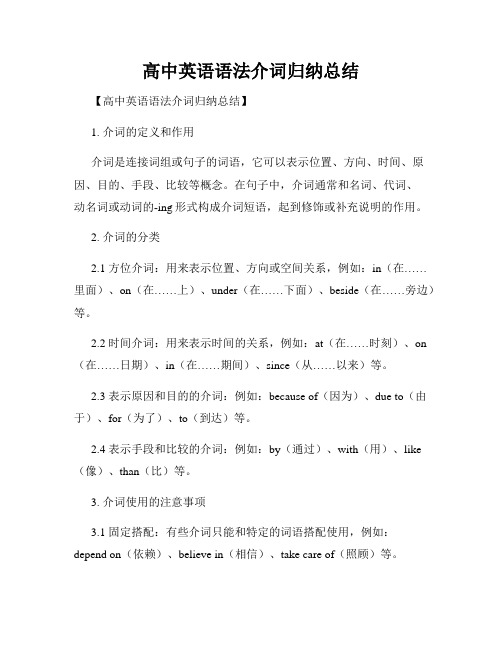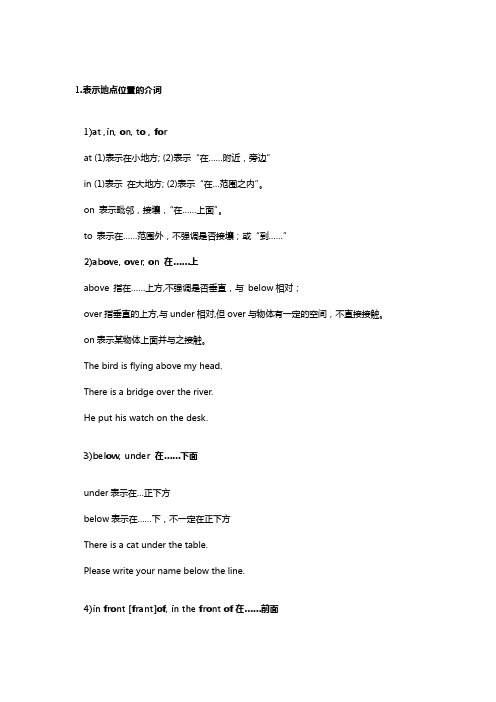高中英语 介词汇总
高中介词的用法总结

高中介词的用法总结
高中英语中介词的用法总结如下:
1. 表示在某时间时,常用at、on、in等介词。
at常用来表示在具体的时间点前,如at 7:30;on用来表示在星期几、在某日以及在某一天的上午或下午,如on Monday、on March 1st等;in则常用来表示在一个较长的时间段里,如in the morning、in the afternoon、in a year等。
2. 表示地点时,常用in、at、over等介词。
in表示在一个范围内的某个地点,如in the field;at表示在一个具体的地点,如at the school gate;over则表示悬空或覆盖着某物,如over the table。
3. 表示方式时,常用by、with等介词。
by表示通过某种方式或手段,如by bus、by phone等;with则表示用某种工具或和某人一起做某事,如with a pen、with my friend。
4. 表示目的时,常用for、to等介词。
for表示为了某个目的而做某事,如for your help;to则表示某个动作的方向或指向,如to the school。
5. 表示比较时,常用than、as等介词。
than表示比较的对象,如I am taller than him;as则表示与某人或某物一样,如as tall as him。
以上是高中英语中介词的一些常见用法,希望对你有所帮助。
如果有任何疑问,建议咨询专业英语教师或者查阅英语语法书籍。
高中英语语法介词归纳总结

高中英语语法介词归纳总结【高中英语语法介词归纳总结】1. 介词的定义和作用介词是连接词组或句子的词语,它可以表示位置、方向、时间、原因、目的、手段、比较等概念。
在句子中,介词通常和名词、代词、动名词或动词的-ing形式构成介词短语,起到修饰或补充说明的作用。
2. 介词的分类2.1 方位介词:用来表示位置、方向或空间关系,例如:in(在……里面)、on(在……上)、under(在……下面)、beside(在……旁边)等。
2.2 时间介词:用来表示时间的关系,例如:at(在……时刻)、on (在……日期)、in(在……期间)、since(从……以来)等。
2.3 表示原因和目的的介词:例如:because of(因为)、due to(由于)、for(为了)、to(到达)等。
2.4 表示手段和比较的介词:例如:by(通过)、with(用)、like (像)、than(比)等。
3. 介词使用的注意事项3.1 固定搭配:有些介词只能和特定的词语搭配使用,例如:depend on(依赖)、believe in(相信)、take care of(照顾)等。
3.2 介词后的宾语:宾语通常是名词、代词或动名词,而且在形式上要与介词相匹配。
例如:for me(对我来说)、of them(他们的)、with singing(用唱歌的方式)。
3.3 介词短语位置:介词短语通常放在句子中适当的位置,以使句子结构更加清晰和流畅。
例如:The book on the table is mine.(桌子上的书是我的。
)4. 常用介词示例4.1 位置和方向介词:in(在……里面)、at(在……处)、on (在……上)、into(进入)、out of(离开)、off(离开)、up(上升)、down(下降)等。
4.2 时间介词:at(在……时刻)、on(在……日期)、in(在……期间)、since(从……以来)、before(在……之前)等。
高中英语介词归纳-超全!!

1.表示地点位置的介词1)at ,in, on, to,forat (1)表示在小地方; (2)表示“在……附近,旁边”in (1)表示在大地方; (2)表示“在…范围之内”。
on 表示毗邻,接壤,“在……上面”。
to 表示在……范围外,不强调是否接壤;或“到……”2)above, over, on 在……上above 指在……上方,不强调是否垂直,与below相对;over指垂直的上方,与under相对,但over与物体有一定的空间,不直接接触。
on表示某物体上面并与之接触。
The bird is flying above my head.There is a bridge over the river.He put his watch on the desk.3)below, under 在……下面under表示在…正下方below表示在……下,不一定在正下方There is a cat under the table.Please write your name below the line.4)in front [frant]of, in the front of在……前面in front of…意思是“在……前面”,指甲物在乙物之前,两者互不包括;其反义词是behind (在……的后面)。
There are some flowers in front of the house.(房子前面有些花卉。
)in the front of 意思是“在…..的前部”,即甲物在乙物的内部.反义词是at the back of…(在……范围内的后部)。
There is a blackboard in the front of our classroom.我们的教室前边有一块黑板。
Our teacher stands in the front of the classroom.我们的老师站在教室前.(老师在教室里)5)beside,behindbeside 表示在……旁边behind 表示在……后面本段2.表示时间的介词1)in , on,at 在……时in表示较长时间,如世纪、朝代、时代、年、季节、月及一般(非特指)的早、中、晚等。
【高中英语】介词大全,你需要的都在这里

【高中英语】介词大全,你需要的都在这里在英语中,介词是一种用来表示词与词、词与句之间的关系的词。
它在句中不能单独作句子成分,后面一般有名词代词或相当于名词的其他词类、短语或从句作它的宾语。
介词主要分为简单介词和复杂介词两大类,复杂介词可以包含两个、三个甚至四个单词,分别简称为“双词介词”、“三词介词”和“四词介词”。
一、简单介词:1.表示地点:at,in,on,to,above,over,below,under,beside,behind,between2.时间:in、on、at、after、from、since、behind3.表示运动:across,through,past,to,towards,onto,into,up,down4.在,在,在5.表示其他:on,about,by,with,in二、复杂介词:1.双词介词:指由两个单词构成的复杂介词。
根据我的观察aheadof在...之前owingto由于但如果不是为了在一起priorto在...之前asfor至于除了那些2.三词介词:指由三个单词构成的复杂介词。
替换的内在一致性forlackof因缺少inreturnfor对...的回报顺便说一句byforceof凭借withrespectto关于3.四字介词:指由四个单词组成的复合介词。
forthepurposeof为了...的目的atthemercyof受...的摆布为了照顾intheteethof不顾,逆着ontheeveof在...的前夕以…为理由根据…方面totheexclusionof把...排除在外withaneyeto为了以…的名义在…的支持下。
高中英语 介词搭配

高中英语介词搭配介词是英语语法中重要的一部分,用于表示名词与动词、形容词、副词之间的关系。
在高中英语中,常见的介词有at,in,on,with,by,about,for,from 等。
下面我们将详细介绍这些介词的搭配用法。
1. 时间介词at表示在某一点时间或具体时间,如at seven o’clock,at noon;in表示在一个时间范围或一天中的某个时间段内,如in the morning,in the afternoon;on表示在某一天或具体某一天的上下午晚上,如on Monday,on the afternoon of July 4th;for表示持续一段时间,如for three days,for a week;since表示自从某个时间点开始,如since 2000。
2. 地点介词at表示在某个小地点或具体地点,如at the school gate;in表示在一个较大的地点范围或建筑物内,如in the classroom;on表示在某个物体上面或表面,如on the table;over表示在某个物体的正上方,如over the bridge;above 表示在某个物体的垂直上方,但不一定是正上方。
3. 方式介词by表示以某种交通工具或方式进行移动或完成某件事情,如by bus,by email;with表示使用某种工具或伴随某种情况完成某件事情,如with pen and paper;in表示以某种语言、方式或风格进行某件事情,如in English。
4. 原因介词because表示因为某个原因或理由,如because of his illness;due to表示由于某个原因或理由,但与because有所区别;owing to表示由于某个原因或理由,也与because有所区别;thanks to表示由于某个原因或理由而感激某人或某事。
5. 条件介词if表示在某个条件下实现某件事情,如if it rains;unless表示除非某个条件不成立或不满足,如unless you study hard;provided that表示在某个条件下实现某件事情,与if相似。
高中英语介词知识点总结

高中英语介词知识点总结高中英语介词知识1表时间的介词:about, around, before, by, at, after, in, on, between, during, for, from, since, till, until, within等。
1.表示时间先后的before,after和in。
before表示某一时刻之前和after表示某一时刻之后。
in一般表示“从现在或说话时刻算起某一段时间之后”,用于将来时。
after则表示以过去为起点的某一段时间之后,用于过去时。
“in+时间段"也可作”在……之内"解。
He will be back in a few days. 他几天之后就回来。
He left on Monday and returned after three days. 他星期一走的,三天后回来的。
It's difficult to draw a horse well in half an hour.半小时之内画好一匹马是困难的。
2.表示"时间延续"的for, from...tofor表示动作或状态延续的时间长度,谓语动词必须是延续性的。
而from...to...表示“从……到……”。
We have studied English for three years. 我们学英语已三年了。
My family lived in Beijing from 1996 to 1999.我家从1996年到1999年住在北京。
3.表示"时限"的介词since, from, by, until(till)since表示动作的起始点,其意是 "从……以来 ",常与完成时态连用。
from表示时间的起始点,其意是"从",常和一般过去时连用。
until(prep. & conj.)意为"直到……为止"。
高中英语知识点归纳介词短语
高中英语知识点归纳介词短语介词短语在高中英语学习中扮演着重要的角色。
它们在句子中起到修饰名词、动词或形容词的作用,帮助我们更准确地表达意思。
掌握常用的介词短语,对于理解和运用英语具有至关重要的意义。
本文将对高中英语中常见的介词短语进行归纳。
一、表示时间的介词短语1. in the morning/afternoon/evening:在早上/下午/晚上例如:I usually go jogging in the morning.2. on Monday/Tuesday...:在星期一/二...例如:We have a meeting on Monday.3. at the weekend:在周末例如:I always go shopping at the weekend.4. from...to...:从...到...例如:The library is open from 9am to 5pm.5. during the summer/winter/spring/autumn:在夏天/冬天/春天/秋天例如:I like swimming during the summer.二、表示地点的介词短语1. at school/home/work:在学校/家/工作例如:I study English at school.2. in the park/forest/restaurant:在公园/森林/餐厅例如:We had a picnic in the park last weekend.3. on the street/corner:在街上/拐角处例如:You can find a café on the corner.4. at the bus stop/train station/airport:在公交车站/火车站/机场例如:I will meet you at the airport.5. by the river/sea/lake:在河边/海边/湖边例如:Let's have a picnic by the lake.三、表示方式的介词短语1. by car/bus/train:乘坐汽车/公交车/火车例如:I usually go to work by bus.2. on foot:步行例如:The supermarket is just a few minutes' walk away. I usually go there on foot.3. with a smile/tears:带着微笑/眼泪例如:She accepted the award with a smile on her face.4. in a hurry/rush:匆忙地例如:I left the house in a hurry and forgot my umbrella.5. by oneself:独自地例如:He likes to travel by himself.四、表示原因的介词短语1. because of:因为例如:We couldn't go to the party because of the bad weather.2. due to:由于例如:The delay was due to the heavy traffic.3. thanks to:多亏了例如:Thanks to your help, we finished the project on time.4. as a result of:由于...的结果例如:As a result of their hard work, they won the competition.5. in order to:为了例如:He studied hard in order to pass the exam.五、表示目的的介词短语1. for the purpose of:为了...的目的例如:We organized a meeting for the purpose of discussing the new project.2. with the aim of:以...为目标例如:He started exercising with the aim of becoming healthier.3. in order to:为了例如:She saved money in order to buy a new car.4. so as to:以便例如:I woke up early so as to catch the first train.5. with a view to:考虑到例如:They made some changes with a view to improving the product.本文简要介绍了高中英语中常见的介词短语,旨在帮助学生提高对英语的理解和应用能力。
高中英语的介词使用
高中英语的介词使用I.分类:1.常用简单介词:about, across, against, among, after, at, behind, besides, beyond, by, concerning, beneath, between, despite, except, during, down, for, from, past, than, under, until 等。
2.合成介词:inside, outside, onto, out of, within 等。
3.短语介词:according to, ahead of, along with, as for, because of, be means of, due to, in spite of, on behalf of, owing to, with regard to 等。
2.介词与“……的”之关系:在英语学习中,一遇到“……的”,大家就会立刻想到’S所有格或者of。
实际上,在很多情况下,“……的”必须借助于介词才能准确表达。
以下请同学们重复记忆:●美国的冬天→the winter in America●停车场的入口→the entrance to the parking lot●穿过森林的小路→the path through the forest●鲁迅的著作→the works by Lu Xun●水中的月亮→the moon reflected in water●历史的见证→the witness to history●对爱的渴望→a longing for love●对我们不利的证据→the evidence against us●阳光下的漫步→a walk in the sunlight●追求名誉的女人→a lady after fame●两人之间的争论→an argument between the two persons3重要介词的重要用法:(1)from:此介词表示“to”相反的方向。
高中英语高考复习常用介词分类汇总(共两大类)
高中英语常用介词汇总一、方位介词1.above 在上面2.across 穿过3.against 与......相反4.along 沿着5.along with 随着6.alongside 沿着7.amid 在......之中8.among 在......之间9.around 围绕10.at 在11.behind 在......的后面12.below 在下面13.beneath 在下方14.beside 在旁边15.between 在............之间16.beyond 超过;超出17.by 在......边上18.by means of 通过19.close to 接近20.down 在......下21.far from 远离22.from 从......起23.in 在里面24.in between 介于两者之间25.in front of 在前面26.inside 在......内27.into 到......里面28.near 在.......附近29.next to 旁边30.off 从(某处)落下;离开31.on 在......上32.onto 朝向,面向(某个方向)33.opposite 对面34.out 离开(某地)边缘35.outside 在......外面;向......外面;36.over 在......上面;悬在......上面;37.past 到另一侧;多于;超过38.round 环绕;围绕;绕过;39.through 穿过;贯穿;40.throughout 自始至终41.to 到42.toward/towards 朝向43.under 在下面44.underneath 在下面45.up 在(较高位置)46.upon 在上面47.via 通过二、其它介词1 about 关于2 according to 根据3 apart from 除了4 as 像;如同;作为;当作5 as for 至于6 as to 至于7 aside from 除......之外8 because of 因为9 besides 此外10 but 但是11 but for 要不是;如果没有12 concerning 关于13 considering 考虑到14 contrary to 与相反15 depending on 取决于16 despite 即使17 due to 由于18 except 除了19 except for 除了20 excluding 不包括21 in addition to 除了22 in case of 万一23 in face of 面对24 in light of 根据25 in spite of 尽管26 in view of 鉴于27 including 包括......在内28 instead of 而不是29 like 像;类似;相似30 on account of 考虑到31 on behalf of 代表32 other than 除了33 owing to 因为34 regarding 关于35 regardless of 不管36 save 除了;除......外37 thanks to 幸亏38 unlike 不像39 versus 对40 with 具有41 with reference to 参考42 with regard to 关于1。
高中英语语法介词
高中英语语法介词介词是英语语法中非常重要的一部分,它们用来表示名词或代词与句子其他成分之间的关系。
下面我们将介绍一些常见的介词及其用法,并给出一些例子。
1. atat通常用于表示在一个时间点或地点。
例如:I will meet you at the airport. 我在机场和你见面。
They arrived at the station at 8 o'clock. 他们八点到达车站。
2. inin通常用于表示在一个较大的空间或时间范围内。
例如:I live in a small town. 我住在一个小城镇。
The concert will be held in the park. 音乐会将在公园举行。
3. onon通常用于表示在某个物体或表面上。
例如:Put the book on the table. 把书放在桌子上。
The cat is sitting on the mat. 猫正坐在垫子上。
4. underunder通常用于表示在某个物体或下方的位置。
例如:The table is under the window. 桌子在窗户下。
The cat is under the bed. 猫在床下。
5. nearnear通常用于表示在某个物体或地方附近的位置。
例如:The school is near the railway station. 学校在火车站附近。
They sat near the fire. 他们坐在火堆旁边。
6. behindbehind通常用于表示在某个物体或人的后面位置。
例如:The car is behind the tree. 车在树后面。
The cat is behind the sofa. 猫在沙发后面。
7. beforebefore通常用于表示在某个物体或人的前面位置。
例如:The bus stop is before the bridge. 公交车站桥前面。
- 1、下载文档前请自行甄别文档内容的完整性,平台不提供额外的编辑、内容补充、找答案等附加服务。
- 2、"仅部分预览"的文档,不可在线预览部分如存在完整性等问题,可反馈申请退款(可完整预览的文档不适用该条件!)。
- 3、如文档侵犯您的权益,请联系客服反馈,我们会尽快为您处理(人工客服工作时间:9:00-18:30)。
介词用法总汇1、早、午、晚要用in,at 黎明、午夜、点与分。
年、月、年月、季节、周,阳光、灯、影、衣、帽in。
将来时态in ... 以后,小处at 大处in。
有形with 无形by,语言、单位、材料in。
特征、方面与方式,心情成语惯用in。
介词at 和to 表方向,攻击、位置、恶、善分。
2、早、午、晚要用in例:in the morning 在早上;in the afternoon 在下午;in the evening 在晚上;in the day 在白天;at 黎明、午、夜、点与分例: at dawn, at daybreak 在黎明时候;at noon 在中午;at night 在夜间;at midnight 在午夜(以上短语都不用冠词)3、at six o**clock 在6点钟;at 7:30 (seven thirty) 在7点半;at half past eleven 在11点半;at nine fifteen 在9点15 分;at ten thirty a.m. 在上午10点30分(也可:seven to five 5点差7分(半小时以上));five minutes after two 2点过5分;at a quarter to two 1点45分;at the weekend 在周末4、年、月、年月、季节、周:即在“某年”,在“某月”,在“某年某月” (但在某年某月某日则用on),在四季,在第几周等都要用in。
例:in 1986 在1986 年;in 1927 在1927 年;in April 在四月;in March 在三月;in December, 1986 1986年12月;in July, l983 1983年7月;in spring 在春季in summer 在夏季in autumn 在秋季in winter 在冬季;in the fist week of this semester 这学期的第一周;in the third week 在第三周5、阳光、灯、影、衣、冒in,即在阳光下,在灯下,在树阴下,穿衣、着装、冒雨等都要用in。
例:Don**t read in dim light. 切勿在暗淡的灯光下看书。
They are reviewing their lessons in the bright light. 他们在明亮的灯光下复习功课。
They are sitting in the shade of a tree. 他们坐在树阴下乘凉。
a prisoner in irons 带着镣铐的囚犯He went in the rain to meet me at the station. 他冒雨到车站去接我。
The poor dressed (clothed) in rags in old society. 旧社会穷人们衣衫褴褛。
以及:in the bright sunlight 在明亮的阳光下 a merchant in disguise 乔装的商人the woman in white (black, red, yellow) 穿着白(黑、红、黄)色衣服的妇女in uniform 穿着制服;in mourning 穿着丧服;in brown shoes 穿着棕色鞋;in his shirt sleeves 穿着衬衫6、将来时态in … 以后例: They will come back in 10 days. 他们将10天以后回来。
I’l l come round in a day or two. 我一两天就回来。
We’ll be back in no time. 我们一会儿就回来。
Come and see me in two days’ time. 两天后来看我。
(从现在开始) After … (从过去开始)7、小处at 大处in例:Li and I arrived at Heishan county safe and sound, all is well. Don’t worry.李和我平安地到达黑山县,一切很好,勿念。
I live in a great city (big city), my sister lives at a small town while my parents live at a village.我住在大城市,我姐姐住在一个小城镇,而我的父母则住在农村。
I’m in Liaoning, at Anshan. 我住在辽宁省鞍山市.8、有形with 无形by,语言、单位、材料in例:The workers are paving a road with stone. 工人们正用石子铺路。
(有形)The teacher is correcting the paper with a new pen. 这位教师正用一支新笔批改论文。
(有形)“Taking Tiger Mountain by Strategy”is a good opera. <<智取威虎山>>是—出好戏。
(无形)The product is separated by distillation into gasoline and gas oil. 这种产品是用蒸馏分离出汽油和粗柴油。
(表示方式、手段、方法——无形)I re ally can’t express my idea in English freely in-deed.我确实不能用英语流利地表达我的思想。
(表示某种语言用in)I wrote a novel in Russian. 我用俄语写了一本小说。
(同上)The kilometer is the biggest unit of length in the metric system.公里是米制中最长的长度单位。
(表示度、量、衡单位的用in )The length is measured in meter, kilometre, and centimetre.长度是以米、公里、厘米为单位来计算的。
(同上)This board was cast in bronze not in gold. 这个牌匾是铜铸的,不是金铸的。
9、特征、方面与方式、心情、成语惯用in 特征或状态:例: The Democratic Party was then in power. 那时民主党执政。
They found the patient in a coma. 他们发现病人处于昏迷状态。
He has not been in good health for some years. 他几年来身体一直不好。
Many who came in despair went away in hope. 许多人带着绝望情绪而来,却满怀希望而去。
The house was in ruins. 这房屋成了废墟。
The poor girl was in tears. 这个贫苦女孩泪流满面。
Her clothes were in rags. 她的衣服穿破了。
His shoes were in holes. 他的鞋穿出窟窿了。
I only said it in fun. 我说这话只是开玩笑的。
She spoke in grief rather than in anger. 与其说她讲得很气愤,不如说她讲得很伤心。
10、还有一些短语也用in,如:in jest 诙谐地,in joke 开玩笑地,in spite 恶意地,in fairness 公正地,in revenge 报复, in mercy 宽大,in sorrow 伤心地等。
His mind was in great confusion. 他脑子里很乱。
The campaign was in full swing. 运动正值高潮中。
Today everybody is in high spirits and no one is in low ebb.今天大家都兴高采烈,没有一个情绪低落的。
She and her classmates are in flower ages. 她和她的同学都正值妙龄。
方面:例:We accepted the item in principle. 我们在原则上接受了这个条款。
They are never backward in giving their views. 他们从来不怕发表自己的意见。
The backward area has achieved self-sufficient in grain. 这个落后的地区在粮食方面已能自给。
A good teacher must be an example in study. 一个好的教师必须是学习的模范。
方式:例:All the speeches were taken down in shorthand. 所有报告都用速记记录下来了。
The Party has always educated us in the spirit of patriotism and internationalism.党一贯以爱国主义和国际主义精神教育我们。
如下成语惯用in例:in all 总计in advance 事前in the meantime 与此同时in place 适当地in hopes of(或in the hope of) 怀着……希望in connection with 和……有关in contact with 和……联系in addition to 除……以外in case of 倘若,万一in conflict with 和……冲突in force 有效的,大批in depth 彻底地in regard to 关于in the neighborhood of 大约、邻近in retrospect 回顾,一想起in behalf of 代表……利益in the least 一点,丝毫in alarm 惊慌、担心in the opinion of 据……见解in the long run 从长远说来in one’s opinion 在……看来in word 口头上in a word 总之in vain 无益地, 白白地in case 如果,万一,以防in detail 详细地in haste 急急忙忙地in conclusion 总之in spite of 尽管in other words … 换句话说in return 作为回报in the name of 以……名义be confident in 对……有信心be interested in 对……感兴趣in doubt 怀疑in love 恋爱中in debt 负债in fun (jest、joke) 玩笑地in hesitation 犹豫不决in wonder 在惊奇中in public (secret) 公开他(秘密地) in a good humour 心情(情绪)好11、“介词at、to 表方向,攻击、位置、善、恶、分”介词at 和to 都可以表示方向; 用at 表示方向时,侧重于攻击的目标,往往表示恶意;用to 表示方向时,突出运动的位置或动作的对象,侧重表示善意。
